|
|
|
Sort Order |
|
|
|
Items / Page
|
|
|
|
|
|
|
| Srl | Item |
| 1 |
ID:
133453


|
|
Big question: how much confidence do you have in your nation's banking system?
/ Lee, Ann; Pelagidis, Theodore; Fourie, Leila; Marques, Fernando, Ocampo, Jose Antonio, Antonini, Massimo, Naik, Prithvi, Britto, Neil
|

|
|
|
|
| Publication |
2014.
|
| Summary/Abstract |
The global banking system is the fundamental conduit of value within nations and across borders. Since the last global financial crisis, however, the role of banks as a repository of value has come increasingly into question. Today, with a fragile recovery in so much of the world, banks and those who manage and regulate them are under attack. We asked our panel of global experts how this crisis of confidence is playing out in their nation or region.
|
|
|
|
|
|
|
|
|
|
|
|
|
|
|
|
| 2 |
ID:
046495
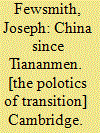

|
|
|
|
|
| Publication |
Cambridge, Cambridge University Press, 2001.
|
| Description |
xvii, 313p.
|
| Standard Number |
0521001056
|
|
|
|
|
|
|
|
|
|
|
|
Copies: C:1/I:0,R:0,Q:0
Circulation
| Accession# | Call# | Current Location | Status | Policy | Location |
| 045298 | 320.951/FEW 045298 | Main | On Shelf | General | |
|
|
|
|
| 3 |
ID:
128317
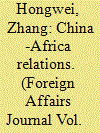

|
|
|
|
|
| Publication |
2014.
|
| Summary/Abstract |
In the past few years, China and Africa, in light of the trend of the times, have launched the Forum on China-Africa Cooperation and established a new type of strategic partnership, thus making new achievements in their relations on the basis of their traditional friendship. Despite the profound and complex changes in China and Africa and the world at large, the nature of China-Africa relations has stayed unchanged. It is what remains unchanged that offers inexhaustible impetus for the growth of this relationship and gives unique advantages to cooperation between the two sides. At a new historical starting point, China-Africa relations are poised for fresh progress. It is essential for the two sides to keep abreast of the times, make innovative and pioneering efforts, and strive for greater achievements in their relations.
|
|
|
|
|
|
|
|
|
|
|
|
|
|
|
|
| 4 |
ID:
129645
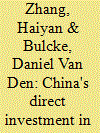

|
|
|
|
|
| Publication |
2014.
|
| Summary/Abstract |
While China is fast becoming an important outward direct investor, its companies are showing an increasing interest to locate in Europe and the European Union (EU). It has been suggested that this can partly be explained by the more lenient attitude of the European countries compared to the US, where some acquisitions were abandoned when they ran into political opposition based on security concerns. Yet, also in Europe, the media follow rather closely each new Chinese entry, and certain politicians have started to criticise the take-over of technology-oriented companies, especially by Chinese state-owned firms. Against the background of a very open foreign direct investment (FDI) policy as measured by OECD FDI Restrictiveness Index for the EU and the individual countries, an overview is given of the pre- and post-establishment obstacles to direct foreign investment. Also, the EU policy measures that directly or indirectly deal with incoming direct investment are discussed. Within the context of the EU competition policy and the merger regulation, the EU Commission has cleared five cases of take-over by Chinese state-owned enterprises. Although the Lisbon Treaty authorises the EU Commission to take charge of investment policy as part of the EU commercial policy, it will take time to realise this. If the announced negotiations about an investment treaty between China and the EU could work out the necessary balance, it would be an important step in achieving more reciprocity between their respective investment regimes.
|
|
|
|
|
|
|
|
|
|
|
|
|
|
|
|
| 5 |
ID:
046295
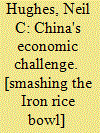

|
|
|
|
|
| Publication |
Armonk, M. E. Sharpe, 2002.
|
| Description |
xv, 235p.
|
| Standard Number |
076560809X
|
|
|
|
|
|
|
|
|
|
|
|
Copies: C:1/I:0,R:0,Q:0
Circulation
| Accession# | Call# | Current Location | Status | Policy | Location |
| 046216 | 338.951/HUG 046216 | Main | On Shelf | General | |
|
|
|
|
| 6 |
ID:
128396
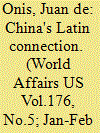

|
|
|
|
|
| Publication |
2014.
|
| Summary/Abstract |
When Brazil opened up its huge offshore petroleum discoveries to foreign developers in October, after holding off on a decision for six years, government leaks indicated that Chinese state oil companies would dominate the bidding for the estimated reserve of eight to twelve billion barrels of oil. When the bids were opened, however, the Chinese proved to be far more cautious than expected and took only a minority participation in the winning consortium dominated by Petrobras, the Brazilian state oil company, and two major Western multinationals, Royal Dutch Shell, the Anglo-Dutch giant, and Total, the largest French oil company.
|
|
|
|
|
|
|
|
|
|
|
|
|
|
|
|
| 7 |
ID:
131145
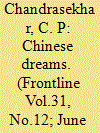

|
|
|
|
|
| Publication |
2014.
|
| Summary/Abstract |
Becoming another China is not easy as that will involve the reduction of expenditure on food subsidies and other welfare measures.
|
|
|
|
|
|
|
|
|
|
|
|
|
|
|
|
| 8 |
ID:
129646
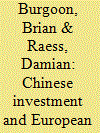

|
|
|
|
|
| Publication |
2014.
|
| Summary/Abstract |
The rapid increase in Chinese foreign direct investment (FDI) into Europe raises important questions about the implications of such for workers and organized labor in Europe: (1) does Chinese FDI flow more or less to regulated labor markets than do other investment sources?; (2) what are the strategies of works councilors and union representatives in dealing with real or expected investment from China?; and (3) how do individual workers view the propriety of Chinese FDI given China's low-wage, labor-unfriendly profile in the global economy? Quantitative and qualitative data on Chinese FDI, individual opinions about China and globalization, and on strategies of labor representatives provide some leverage to preliminarily answer these questions. First, Chinese FDI does not seem to be more (or less) focused on investing in the least regulated labor markets than other sources of FDI. Second, interviews with works councilors and union representatives in Germany, France and the Netherlands affirm a cautiously optimistic view of Chinese investors as no more or less threatening to organized labor than other investors. Third, analysis of attitudes about Chinese and European interests in managing globalization suggest that less-skilled, more vulnerable, pro-labor-union workers in Europe tend to be more rather than less enthusiastic about Chinese management than their fellow citizens. These patterns suggest a surprising, if tentative, embrace by workers and their representatives in Europe of that investment.
|
|
|
|
|
|
|
|
|
|
|
|
|
|
|
|
| 9 |
ID:
096492
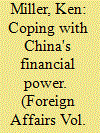

|
|
|
| 10 |
ID:
129647


|
|
|
|
|
| Publication |
2014.
|
| Summary/Abstract |
Chinese investment in Central and Eastern Europe (CEE) is booming. As China's investment pattern has emerged so far, it appears to have little to do with Chinese firms' preferences for liberal policy regimes, tolerance for corruption, or reliance on communist-era networks. This article documents the current size and shape of Chinese firms' efforts to internationalize in this economic space, demonstrating an important difference between Chinese investment behavior in CEE and in the EU-15, namely the region's much more active use of greenfield activity (and lighter use of M&A and strategic alliances). Case studies of each mode (greenfield, M&A, and strategic alliances) reveal little evidence of a "China, Inc." approach and much evidence that Chinese firms are more motivated by market access than by technology or management assistance.
|
|
|
|
|
|
|
|
|
|
|
|
|
|
|
|
| 11 |
ID:
124564


|
|
|
|
|
| Publication |
2013.
|
| Summary/Abstract |
We empirically analyze the host-country determinants of Chinese outward direct investments (ODI) in the period from 2003 to 2008, using disaggregated data by country and sector and distinguishing between state-owned or controlled enterprises (SOEs) and privately-owned firms. Our results show that the pattern of Chinese ODI differs according to corporate ownership. Private firms are attracted by large markets and host-country strategic assets and are averse to economic and political risks when choosing investment locations abroad. Differently, state-owned or controlled enterprises follow the strategic needs of their home country and invest more in natural resource sectors, being largely indifferent to the political and economic conditions in the host countries.
|
|
|
|
|
|
|
|
|
|
|
|
|
|
|
|
| 12 |
ID:
130981
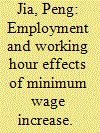

|
|
|
|
|
| Publication |
2014.
|
| Summary/Abstract |
Using a difference-in-differences model, the present paper provides empirical evidence of minimum wage effects on employment and working hours in China. The results show that male employment is not affected by a minimum wage increase, although men's working hours do increase. In contrast, female employment is more likely to be negatively affected by a minimum wage increase, while their working hours remain unchanged. This may lead to women being in a more disadvantaged position in the workforce, and adopting a monthly minimum wage may induce firms to extend men's working hours. Therefore, to better protect disadvantaged workers, we suggest that minimum wage regulation should focus on the target group of less-educated women, and that a unified minimum hourly wage needs to be set for both full-time and part-time workers. Meanwhile, the importance of human capital accumulation should be addressed in alleviating the negative effects of minimum wage increases.
|
|
|
|
|
|
|
|
|
|
|
|
|
|
|
|
| 13 |
ID:
127772
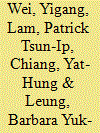

|
|
|
|
|
| Publication |
2014.
|
| Summary/Abstract |
To curb price speculations and overheated investment in the real estate market, the mainland Chinese government has determined to tighten bank lending to the market in recent years, by resorting to administrative tools through specific real estate control policy. With hindsight, the market response seems to have invalidated the policy initiatives. This research is aimed at investigating the impediments to achieving the laudable policy objectives of using administrative credit controls. A series of research interviews with property practitioners unraveled prevalent evasive practices and illicit tactics adopted by developers to thwart policy effects. This study leads to a better understanding of the institutional backdrop behind the less-than-expected results of the real estate macro-control measures. To better steer the real estate market, effective monetary control requires both the government and industry to make concerted efforts and consistent headway towards a complete, transparent and responsive ensemble of institutional arrangements.
|
|
|
|
|
|
|
|
|
|
|
|
|
|
|
|
| 14 |
ID:
124246
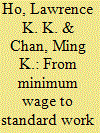

|
|
|
|
|
| Publication |
2013.
|
| Summary/Abstract |
This paper aims to highlight the significance of labour issues - namely, the minimum wage (MW) and standard working hours (SWH) - in shaping candidates' electoral platforms in the 2012 chief executive (CE) election of the Hong Kong Special Administrative Region (HKSAR) under the sovereignty of the People's Republic of China (PRC). We first offer a brief review of labour politics regarding the MW case as a precursor to the SWH drafting and enactment process. We then provide an analytical delineation of some of the labour and socio-economic dimensions of the CE electoral contest by comparing the candidates' campaign planks in relation to SWH. We then attempt to predict the likely course of the SWH debate under the leadership of Leung Chun-ying, who eventually won the CE election and assumed power on 1 July 2012. We conclude by examining Leung's social engineering attempts to increase popular support amongst low- and middle-income (LMI) households as part of his long-term strategy for the 2017 CE elections and his broader Beijing-entrusted political agenda.
|
|
|
|
|
|
|
|
|
|
|
|
|
|
|
|
| 15 |
ID:
049028


|
|
|
|
|
| Publication |
Tokyo, Japan Forum on International Relations, 1995.
|
| Description |
65p.
|
|
|
|
|
|
|
|
|
|
|
|
Copies: C:1/I:0,R:0,Q:0
Circulation
| Accession# | Call# | Current Location | Status | Policy | Location |
| 039549 | 338.951/FUT 039549 | Main | On Shelf | General | |
|
|
|
|
| 16 |
ID:
124547
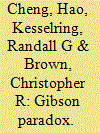

|
|
|
|
|
| Publication |
2013.
|
| Summary/Abstract |
Recent literature has advanced the view that the Gibson paradox, or the positive correlation of the price level with nominal interest rates, is nearly always a gold standard phenomenon. We argue that the Gibson correlation is more accurately classified as a statistical artifact of commodity money systems, with the gold standard merely representing one such system. Using new evidence from Chinese monetary history, this article gives evidence that the Gibson paradox appeared during China's silver-cored metallic standard era. Estimates obtained from recursive ordinary least squares specifications and vector auto-regressions performed, using the Shanghai Yinchai Rate and the Chinese Wholesale Price Index, confirm a Gibson correlation for China during the period 1873-1924.
|
|
|
|
|
|
|
|
|
|
|
|
|
|
|
|
| 17 |
ID:
124545
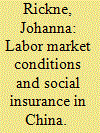

|
|
|
|
|
| Publication |
2013.
|
| Summary/Abstract |
This paper provides micro-level evidence on the relationship between labor market conditions and social insurance participation among Chinese industrial firms. I find that the increased scarcity of labor over this period was a quantitatively important driver of participation. Moreover, a comparison of the responses in different segments of the labor market shows that the response was relatively stronger in sectors with larger shares of uninsured workers, namely in private firms, those with a larger share of low-educated workers, and those without labor unions. The results suggest that a tighter labor market in the years ahead can aid policy makers to implement social insurance programs and combat insurance inequality.
|
|
|
|
|
|
|
|
|
|
|
|
|
|
|
|
| 18 |
ID:
124892


|
|
|
|
|
| Publication |
2013.
|
| Summary/Abstract |
Many studies raise doubts about the effectiveness of the institutions, programmes and instruments that shape the Chinese national innovation system. This article scrutinizes central-local interactions in the national Torch Programme that has governed a large group of high-technology zones since 1988. The Torch Programme's procedural practices challenge widely shared assumptions about the dirigiste character of Chinese innovation policy. It combines centralized definition of programme objectives with extensive local implementation experiments. As three case studies demonstrate, bottom-up policy innovations are effectively fed back into national programme adjustments and into horizontal policy diffusion. The array of organizational patterns and promotional instruments that emerges from competitive "experimentation under the shadow of hierarchy" (ESH) goes way beyond what could have been initiated from top down. We hypothesize that the procedural strengths displayed in the Torch Programme may provide better indicators of future innovative potential in China's high-technology zones than retrospective statistical indices and benchmarks that are derived from OECD experience.
|
|
|
|
|
|
|
|
|
|
|
|
|
|
|
|
| 19 |
ID:
134030


|
|
|
|
|
| Publication |
2014.
|
| Summary/Abstract |
Weak rule of law, corruption and political risk are factors found to deter foreign direct investment (FDI) and all are characteristics of Cambodia's investment environment. Yet Chinese outward FDI has been found to contradict these general trends, as illustrated by high levels of Chinese investment in Cambodia. This article analyses how Chinese firms are able to successfully invest in Cambodia and finds that variation in ownership type (state owned or private), investment size and the degree of mobility of the assets invested determine the Chinese investor's strategy. For China's state owned enterprises (SOEs) in the hydropower sector, Chinese government support in the form of aid and loans to the government of Cambodia secures approval and protection for investments. Private Chinese firms with smaller and more mobile investments in Cambodia's garment industry, on the other hand, rely on industry-wide collective action facilitated by cultural and linguistic ties both to other ethnically Chinese foreign investors and to Chinese Cambodians in the industry. Finally, in the land and resource sector, Chinese firms secure a politically connected local stakeholder to gain approval and protection for large investments.
|
|
|
|
|
|
|
|
|
|
|
|
|
|
|
|
| 20 |
ID:
124896
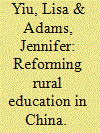

|
|
|
|
|
| Publication |
2013.
|
| Summary/Abstract |
The Chinese state's commitment to improve teaching quality in rural regions is a key component of national efforts to close the rural-urban education gap. In this paper, we investigate an understudied but critical dimension of quality teaching: teacher expectations. We employ longitudinal data gathered in Gansu Province in 2000 and 2007 to first examine whether teacher expectations for rural youth are conditioned by students' social origin and teacher background characteristics. Next, we determine the predictive accuracy of their expectations. Our results highlight the ways in which teacher expectations condition the sorting of rural children among different schooling tracks with distinct life trajectories. Significantly, teachers are more likely to hold lower expectations for students from disadvantaged backgrounds. In addition, non-local teachers hold lower expectations for rural children compared to local teachers. Finally, a low percentage of teachers expect students to enrol in post-compulsory vocational education. We consider the implications of these results for both educational policy and social inequality.
|
|
|
|
|
|
|
|
|
|
|
|
|
|
|
|
|
|
|
|
|